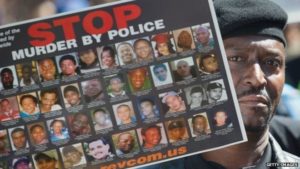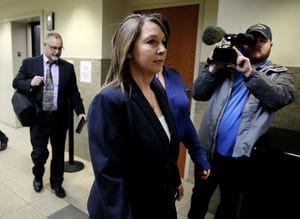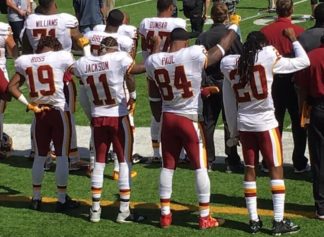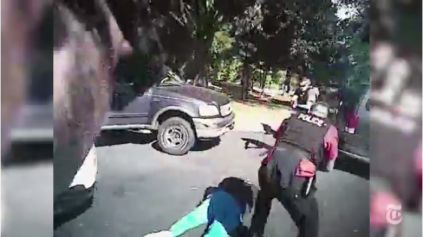
Photo courtesy of Getty Images
A United Nations working group is calling on the U.S. government to beef up its protection of African-American citizens amid a string of recent killings by police — which they’ve compared to modern-day lynchings.
According to Reuters, the U.N. Working Group of Experts on People of African Descent issued a report Monday detailing the ways in which U.S. police killings of Black people are evocative of the mob lynchings of Blacks during the 19th and 20th centuries. The report will be debated at the the U.N. Human Rights Council on Monday, the news site stated.
The group’s report comes on the heels of two police shootings involving Black men in Tulsa, Oklahoma and Charlotte, North Carolina. Terence Crutcher, 40, was shot and killed by a Tulsa police officer Friday after his SUV reportedly stalled in the middle of the road. Days later, Charlotte man Keith Lamont Scott was gunned down by police as he reportedly waited for his son to return home from school. Authorities claimed Scott was armed with a gun and refused to drop his weapon.
The recent shootings fanned the flames of racial tension in America, sparking heated protests organized by citizens demanding an end to the senseless killings.
Per the U.N. Working Group of Experts on People of African Descent, such high-profile killings of Black citizens by police “and the trauma they create are reminiscent of the past racial terror of lynching.” A 2015 report by the non-profit Equal Justice Initiative backed up the group’s claims by pointing out that 3,959 Black people were killed in “racial terror lynchings” in 12 states across the South between 1877 and 1950.
“Impunity for state violence has resulted in the current human rights crisis and must be addressed as a matter of urgency,” said committee chairwoman Mireille Fanon Mendes-France.
This isn’t the first time the U.N. has issued a scathing report of the U.S. government’s poor handling of racial injustice, however. In August, U.N. Special Rapporteur and Kenyan human rights activist Maina Kiai released a critical report calling the U.S. out on its discriminatory treatment of Black Americans, racially biased criminal justice system and violations of citizens’ basic rights.
“African-Americans are subjected to systematic police harassment — and sometimes much worse — often for doing nothing more than walking down the street or gathering in a group,” Kiai wrote in a lengthy 6,500-word report. “People have good reason to be angry and frustrated at the moment. And it is at times like these when robust promotion of assembly and association rights are needed most.”
Following a visit to the U.S. in February of this year, the U.N. working group also urged the U.S. government to pay reparations to the descendants of enslaved Africans. According to Atlanta Black Star, the group stopped in Washington, D.C.; Baltimore; Jackson, Mississippi; Chicago; and New York City and found that African-Americans were still experiencing systematic racism and discrimination.
“The colonial history, the legacy of enslavement, racial subordination and segregation, racial terrorism, and racial inequality in the U.S. remains a serious challenge as there has been no real commitment to reparations and to truth and reconciliation for people of African descent,” the Working Group wrote in its report.
“Despite substantial changes since the end of the enforcement of Jim Crow and the fight for civil rights, ideology ensuring the domination of one group over another, continues to negatively impact the civil, political, economic, social and cultural rights of African-Americans today,” the five-member group added.
The Working Group went on to assert that police shootings involving Black victims largely go unpunished because they’re often investigated by the very departments that employ these “killer cops.”
Instead, the group suggested that the U.S. create a national system to track police killings and excessive use of force. According to Reuters, it also recommended that federal and state legislators begin to acknowledge the impact(s) of slavery and racial injustice as a method of mending strained race relations.


